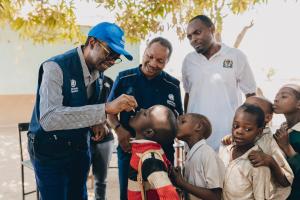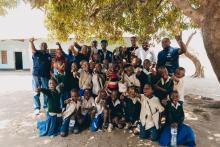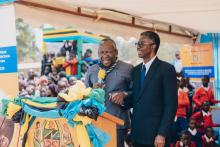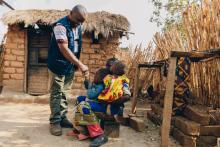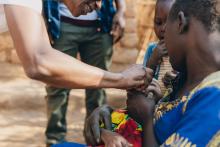Tanzania launches an intensive Polio vaccination campaign in six border regions.
Rukwa- More than 3 million children in six border regions are receiving vaccination in Tanzania against polio from 21st to 24th September 2023, following its recent resurgence after seven years of no recorded cases. The regions include Rukwa, Katavi, Mbeya, Kagera, Songwe and Kigoma.
Laboratory tests confirmed a recent polio virus case from Sumbawanga Municipality, in Rukwa. In response, the government, supported by the World Health Organization (WHO) and partners, announced the launch of a special campaign for droplet vaccination against Polio (nOPV2) for children born after 2016 and are under the age of eight years. This campaign aims to protect them from the virus which can lead to permanent disability.
During the four-days campaign, 5,291 health service providers have been deployed in the regions, with each team consisting of three service providers. Vaccination services is administered, through door-to-door visits, in schools, and in various community gathering places, including houses of worship.
On behalf of the Minister of Health, Hon. Ummy Mwalimu, the Regional Commissioner Hon Charles Makongoro Nyerere underscored that although Tanzania was declared polio-free by the World Health Organization in November 2015, the recent resurgence in some border regions necessitated a swift and comprehensive vaccination campaign.
“Remember, prevention is better than cure. I want to encourage parents and guardians to cooperate with health care providers to ensure their children receive the vaccination,”
The Country Representative of WHO, Dr Charles Sagoe-Moses emphasized that the health of a child is critical for the wellbeing of any family and prosperity of a nation. He affirmed that polio vaccine is safe and effective and prevent serious illness or death from polio
“Our weaponry is not vaccine alone. It is vaccination. This mean vaccination to every eligible child. Two rounds of campaigns are planned. I’m confident that this campaign will be a success due to the level of commitment of the leadership and workforce, collaboration among different sectors and close supervision, monitoring and evaluation at all levels,”
Polio is a highly infectious disease, mostly affecting young children, that attacks the nervous system and can lead to spinal and respiratory paralysis, and in some cases death, according to the World Health Organization (WHO).
Apart from supporting the vaccination campaign, WHO has also expanded its support in polio eradication by extending environmental surveillance for polio. The surveillance drive in Tanzania is part of Africa continent-wide environmental surveillance that was initially planned to be implemented in 46 countries under the auspices of the Global Polio Eradication Programme.
Communications Officer
WHO Country Office, United Republic of Tanzania
Tel: +255 744377899 (Phone)
Email: adjeidum [at] who.int (adjeidum[at]who[dot]int)
Email: mwengeew [at] who.int (mwengeew[at]who[dot]int)
Tel: +255 754 886441
